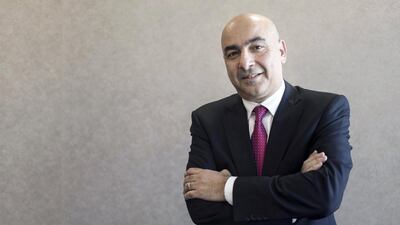The insurance industry veteran Wael Al Sharif has been chief executive of Takaful Emarat for two and a half years, during which time he has renovated the management structure at the UAE insurer and masterminded its landmark rights issue on the Dubai Financial Market – a Dh50 million cash call to fund future growth. Here Mr Al Sharif explains the logic of the rights issue and the strategy in the growing but challenging sector of regional insurance.
Why was the rights issue needed?
The rights issue was central to our comprehensive capital-raising plan in support of Takaful Emarat’s strong growth momentum. The proceeds will be used to capitalise on the company’s recent restructuring under a new management team, and its return to operating a profitable underwriting model. Building on this growth, the new capital will be used to strengthen Takaful Emarat’s back-office function, grow and develop its distribution channels and sales network across the UAE, in particular in the Northern Emirates. The capital will also be invested in the company’s digital and interactive client service technologies to ensure optimal customer service and policy management.
In addition, the funds will be used to streamline Takaful Emarat’s investment, ensuring a more stable and predictable income and return on investment. Takaful Emarat is now uniquely positioned in the market for long-term growth as one of a few takaful insurers approved by the Dubai Health Authority to provide health insurance as part of its roll out of mandatory health insurance.
Was a rights issue the most effective way of raising capital?
For our business, it was the optimal route.
What were the challenges it raised?
The process was straightforward, despite being time-consuming, with management embarking on a range of public-education initiatives. These included DFM broker and investor meetings as well as media relations and broadcast interviews to explain Takaful Emarat’s business strategy and growth potential as well as the tradable rights issue mechanism itself.
The management structure has been overhauled. Talk me through the logic of this.
Since listing in 2008, and most specifically over the past 24 months after management and operational restructuring, the company has become the country’s leading Sharia-compliant provider of life and health insurance products. We have attracted a significant, supportive and stable shareholder base, signalling the market’s confidence in Takaful Emarat’s strong business strategy and growth potential. The restructuring has returned our business to a more efficient operating model focused on diversifying distribution channels, maintaining an efficient cost structure and expanding in our UAE market. The benefits of this strategy was clearly demonstrated in the recent financial results, showing strong growth in takaful income. The group now has a profitable underwriting model, underpinned by a strong management team with international experience.
What is the state of the takaful industry in the region?
There are three factors driving the growth of the takaful insurance market in the UAE. Firstly, the growth of the general Islamic banking and finance sector, to which the takaful insurance market is closely aligned. According to a recent study by [the consultants] EY, it is expected to continue the double-digit expansion it has experienced over the past decade.
Secondly, the relatively low penetration of insurance in the Gulf, about one fifth of the global average, indicates the potential for long-term growth. For the UAE, this is buoyed by the Dubai Health Authority’s roll-out of mandatory medical insurance, of which Takaful Emarat is one of a select few takaful insurers approved to provide cover.
Thirdly, other regulatory measures, such as the Central Bank's creation of a single Sharia board to monitor Islamic banking, enhanced requirements for liquid assets and more stringent corporate governance requirements, will benefit companies such as Takaful Emarat.
We are also seeing opportunities in the distribution space and have recently signed a new agreement with the real estate developer Wahat Al Zaweya to act as the exclusive provider of life and health insurance to thousands of its home mortgage clients. Our existing partnerships with major financial institutions such as RAKBank and Emirates Islamic Bank extend our product reach to the clients of well-established and respected domestic companies. Just to provide an idea of the growth of this industry, the global takaful industry is expected to reach US$20 billion by 2017, according to Moody’s. This underlines consumers’ continued demand for takaful products, resulting in double-digit growth for the industry experienced since the beginning of the decade.
What is your view on Dubai’s roll-out of compulsory health insurance?
The progressive roll-out of mandatory health insurance in Dubai, which started in February 2014, is expected to achieve 100 per cent coverage by next June, and is an industry-changing development, as it aligns the emirate with more developed countries.
How would you describe your management style?
My management style is pretty straightforward. I like to engage with people, understand processes and what works and what does not, and take the necessary action to ensure our business runs smoothly and profitably. Essential to our success has been the dedication of the Takaful Emarat team. They have been magnificent over the past 24 months as we restructured and focused on growth.
Who is the management leader you found/find most inspiring?
I don’t have one management leader in mind as such but I am constantly inspired by the large number of successful family businesses across all aspects of industry in the UAE. This country is truly unique as it fosters a “can do” mentality that supports innovation and aspires to be the best. The Takaful Emarat team fully embraces this culture and inspires me every day.
fkane@thenational.ae
Follow The National's Business section on Twitter

